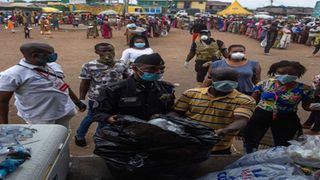
A police officer assists volunteers organising food parcels at a food distribution organised by the government to help residents to cope with the lockdown at the Agbogbloshie market in Accra, Ghana in this picture taken on April 4th 2020.
| AFPNews
Premium
Coronavirus restrictions drew us closer as a family
What you need to know:
- Like a majority, I saw the indefinite lockdown as a chance to take a meaningful break.
- No one foresaw the rippling effects of the pandemic on daily life.
Many of us had great expectations at the beginning of the year. For some Ghanaians, it was on the account that the double “20” in “2020” stood as a metaphor for identical twins, a symbol of good luck in some of our cultures.
I had a multitude of plans, starting with completing studies and focusing full time on my writing career.
Then covid-19 happened. In Ghana, news of the first case elicited excitement among students in many schools.
Like a majority, I saw the indefinite lockdown as a chance to take a meaningful break.
No one foresaw the rippling effects of the pandemic on daily life.
Classes moved online and religious services abruptly ground to a screeching halt.
My father lost his job while my mother closed her shop in accordance with government directives meant to stop the spread of the deadly virus.
With the family finances under strain, we changed routines and reordered priorities, eating one meal instead of two a day, subscribing to cheaper data bundles and limiting internet use to online classes.
In addition, we cut down on using home appliances like the blender and microwave to save on electricity.
Life in the lockdown increasingly became uncomfortable.
I suffered mentally since restrictions meant I could not visit friends and relatives.
I became obsessed with reading about the pandemic while wondering when normality would return so that my parents could begin working again.
Tired of the despondency, I reduced my exposure to news.
To gain some semblance of control over my life, I organised a family book club.
The Long Winter
One of the books that resonated with us was The Long Winter, an autobiographical novel by Laura Ingalls Wilder.
The story closely mirrored our life in the coronavirus pandemic.
The autobiography centres on the author’s family’s struggle to survive a terrible winter in South Dakota, where snow blockaded the railway line and cut off food and other vital supplies.
Despite mass starvation and other hardships, Wilder’s family hang on to the hope that spring would come. It eventually did.
From Wilder’s resilience, we drew strength and optimism that buoyed us through the darkest days.
As a religious family, we drew courage from the fact that God was aware and in control of our situation.
We were optimistic the situation would change for the better at the appointed time.
Though I could not leave home or eat as I pleased, spending time with family drew us closer.
After lockdown restrictions eased, my siblings and I went for long walks together.
We got lost at times but always found our way back home by luck and ingenuity.
We took delight in challenging one another to be first to finish their chores and earn the bragging rights for the day.
Watching movies together also evoked a camaraderie us, laughing and crying together.
To be sure, things are still precarious financially, but not dire enough to dim the joy and solicitude a tightly-knit family provides.
My father got his job back but works from home.
My mother is in the process of reopening her shop, signalling sunny days ahead.
This story is made possible by the Mastercard Foundation Covid-19 Public Awareness Campaign in partnership with Covid HQ Africa www.covidhqafrica.com and Nation Media Group. To find out more on how to get your story published, visit www.covidhqafrica.com / https://africanartincontext.com





